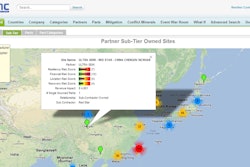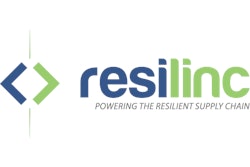Santa Clara, Calif.—Sept. 17, 2013—Resilinc Corporation, a provider of supply chain resiliency solutions, announced the availability of EventWatch Professional, a new supply chain risk management service providing 24/7 monitoring and detection of global events that threaten to disrupt supply chains worldwide.
Resilinc monitors thousands of global news sources, identifies critical supply chain developments, and then filters, researches and notifies clients in regard to potential supply chain threats. Intelligent filtering capabilities eliminate redundant notifications and reduce time spent on non-supply chain impactful events.
“Prior to using EventWatch, our clients were spending a tremendous amount of time manually sifting through hundreds of news feeds per day in order to monitor global events that might impact the flow of goods and services to their customers,” said Jon Bovit, chief marketing officer at Resilinc. “Resilinc EventWatch streamlines this work effort, and clients now receive only those notifications which have already been researched and vetted.”
Constant manual monitoring by an individual person or company for the many types of supply chain disruption events can be daunting. To address this problem, Resilinc now offers EventWatch Professional as a way to enable all procurement, sourcing and supply chain professionals to simply and cost-effectively monitor for—and quickly respond to—potential supply chain disruptions.
Resilinc EventWatch Professional provides email notifications of researched threats, along with a quick summary of the event’s potential impact. Additionally, each event notification provides:
- Event details and known impacts
- Industries and geographic areas potentially impacted
- Informative links for further information and research
Resilinc EventWatch monitors more than 25 different types of disruption events, ranging from catastrophic global crises, such as earthquakes, hurricanes and floods, to isolated incidents, such as factory fires, and port and labor strikes, as well as government regulatory actions. According to its historical data on notifications covering supply chain risk events during the last year, approximately 24 unique events on average were found to have occurred each month. The company’s findings further showed that these supply chain disruption events happen globally in often remote locations and, as a result, they are often difficult to detect and mitigate without a comprehensive effort, leveraging many different news sources across multiple languages.
A Chilean port strike in 2012 provides an excellent example of the potential ramifications of a prolonged disruption event. Resilinc alerted clients on March 20 that a long strike was taking place at a Chilean port. Resilinc then sent an update on March 28 warning that Codelco, Chile's largest copper mine, was no longer able to send shipments because of the continuing port strike coupled with—and compounded by—an internal strike. Then, on April 1, Resilinc reported that the mine had declared a critical force majeure—after having monitored the early events and signs of looming problems for nearly two weeks before the mine’s declaration. When force majeure events occur, costs typically rise due to unavailability of supply.
In another example, a factory fire, in October of last year at a large Japanese company manufacturing super absorbent polymers, had most media organizations reporting that diapers would be in short supply. However, Resilinc’s EventWatch research identified other industry applications of the super absorbent polymer which, in addition to diapers, is a key ingredient in vehicle fuel monitoring systems, and medical and surgical pads, as well as composites and laminates, and wire and cable blocking. Resilinc clients reported that the effects of the disruption took more than two months to trickle in through multiple tiers of their supply chains, and that the Resilinc EventWatch notification gave them two months advance notice—ample time to assess and respond to the potential impact of the Japanese event.
According to Bindiya Vakil, CEO of Resilinc, “Force majeure and other disruptive events can often create major supply chain bottlenecks, which can cause widespread profit leakages for customers as inventory dries up and capacity shortages result in higher raw material prices. In these highly disruptive allocation situations, no one in the supply chain can get adequate supply of the necessary raw materials or parts. The ability to be the first to know, and then to react quickly and decisively based on relevant research, can be a source of major competitive advantage to companies who depend on lean supply chains with low inventory levels and very little ability to absorb disruptions.”

















